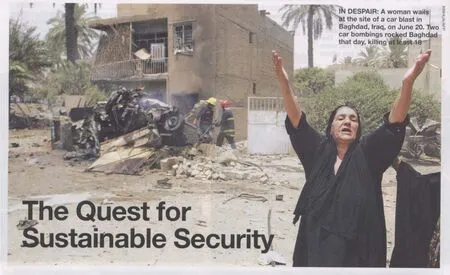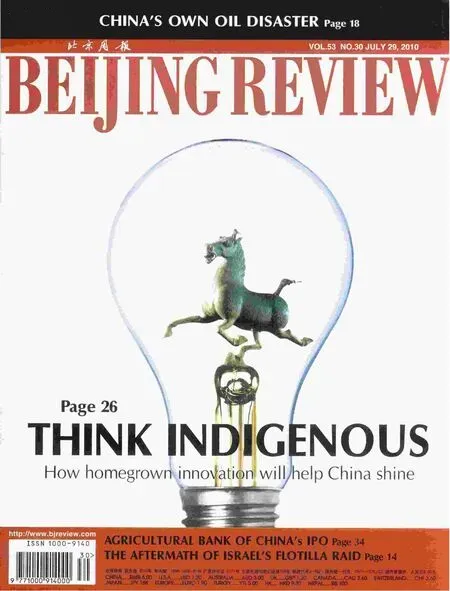The Quest for Sustainable Security
2010-03-05
The Quest for Sustainable Security


Since the beginning of the 21st century, non-traditional security problems have become significant threats to world peace. These include economic, financial and information security, terrorism, drug trafficking, transnational crime and infectious diseases.
In this article for Beijing Review,Liu Jiangyong,a professor with Tsinghua University’s Institute of International Studies, introduces a new security concept—“sustainable security.” In his view, as traditional and nontraditional security threats become interwoven, the concept is gaining prominence on international agendas. Edited excerpts follow:
Sustainable security has caught people’s attention in the aftermath of the 2003 U.S. invasion of Iraq. The war has shown the costly U.S. national security model is ineffective and unsustainable.
China has always been pursuing lasting peace. But peace is not absolutely equal to security. Peace is the absence of war, but security means a complete absence of any threat. Peace is the basic requirement of security, but there is not necessarily safety in conditions of peace.
Sustainable security means a country, a region or the world at large remains in a state of long-term peace and security. It calls for efforts to prevent social unrest, skirmish, war, as well as global crises such as environmental degradation and nuclear proliferation. It is a strategic issue bearing on relations between different nations and between mankind and nature.
Sustainable security includes both traditional and non-traditional security, and concerns both domestic and international security. Its goal is to guarantee the sustainability of security with low costs while protecting national security from being interrupted by threats.
Sustainable security should be a shared vision of all countries, because a national security issue may have implications for regional and international security. One who endangers the security of other countries is not in a position of achieving sustainable security. Only when members of the world community cooperate with one another to address security challenges will they be able to find common and lasting security.
In brief, sustainable security is as important as sustainable development. After all, no development can be achieved or sustained without security.
A significant concept
Sustainable security emphasizes the unity of national security and the environment. It insists no means of war should be used in solving disputes between sovereign states, and it is especially against the use of nuclear weapons or other weapons of mass destruction. Nuclear proliferation and arms races should be halted. Activities undermining social, cultural, economic and natural environments in exchange for one state’s or a group of countries’ security interests are firmly rejected.
Sustainable security highlights the sustainable nature of peace and security. It aims to maintain long-term world peace in terms of traditional security while addressing nontraditional security threats by strengthening international cooperation.
Measures to achieve sustainable security should be preventive, comprehensive and collaborative. Nowadays, threats to national security have become more and more diverse, and traditional and non-traditional security factors are interwoven. No single country alone can cope with the challenges. Countries should work together in social, cultural, religious, economic and political fields in a bid to eliminate security threats at their source. Meanwhile, the UN is expected to play a greater role in helping achieve sustainable security for mankind.
Sustainable security underlines the integration of national, regional and global security. It emphasizes the long-term stability of a country, and considers a country’s development, prosperity, democracy, rule of law, equality and justice as preconditions of domestic stability. It advocates countries adhere to the UN Charter to ensure the security of sovereign states. Any national security policy should not pose a threat to other countries. Regional security arrangements should respect the security concerns of relevant countries and seek on this basis to achieve common security.
Sustainable security promotes peaceful multilateralism among countries. Asian multilateral security mechanisms such as the ASEAN Regional Forum, the Shanghai Cooperation Organization and the sixparty talks aimed at addressing the Korean Peninsula nuclear issue offer telling examples. This is a security model with Asian features, which is against unilateral military actions or joint use of force to settle international disputes.
China has advocated multilateralism in opposition to America’s preemptive use of force and power politics. U.S. President Barack Obama, however, has also underscored the importance of multilateralism since coming to power last year. But there are substantial differences between the multilateral policies implemented by the two countries. At both regional and global levels, China pursues peace and non-violence, while joint military operations feature prominently in U.S.-dominated multilateralism.
World structure evolution
Sustainable security calls for respect for the diversity of the international community, promotes mutual respect of the world’s different cultures and social systems and nations’ different development paths, and stresses peaceful coexistence.
At present, the world features one superpower and multiple strong powers. The United States, the only superpower, coexists with other big powers by cooperating and competing with them. But in the long run, the international structure will head for diversified and multi-polar coexistence, and then evolve to pluralistic integration.
A future multi-polar world will be characterized by deepening mutual interdependence rather than multi-polar rivalry of the type that appeared before the two world wars. That means the pursuit of sustainable security is possible in the future.
The establishment of the Group of 20 mechanism indicates the voice of developing countries in international affairs has increased, and international coordination dominates today’s international relations. This has also increased the possibility of the realization of sustainable security.
This is all due to changing times. The current era is not an era of imperialism and colonialism. There are no more wars triggered by competition for colonies. Economic globalization has unprecedentedly deepened the interdependence of countries. There are no more exclusive trading blocs or aggressive military blocs. Nuclear weapons have reduced the chances of war between major powers. The development of information technology helps countries to avoid resorting to war because of a lack of communication. International institutions and security regimes are relatively healthy. The international community is fully aware war will harm national security interests, and peace and development remain the mainstream pursuits of the world.
At the same time, the global financial crisis has severely affected the world economy. Unemployment and asset shrinkage could give rise to social unrest, jeopardizing domestic security and social and political stability. Against this backdrop, all countries face pressing challenges to maintain longterm domestic stability and public safety.
Moreover, international terrorist forces have formed a below-the-radar global network, which poses an unprecedented challenge to the United States. In addition, the recent British Petroleum oil spill in the Gulf of Mexico caused a severe ecological disaster in the area. This shows—even among allies—accidents can cause serious environmental threats to one another.
Nowadays, threats to national security have become more and more diverse, and traditional and non-traditional security factors are interwoven
